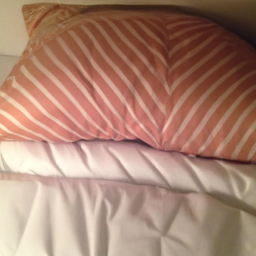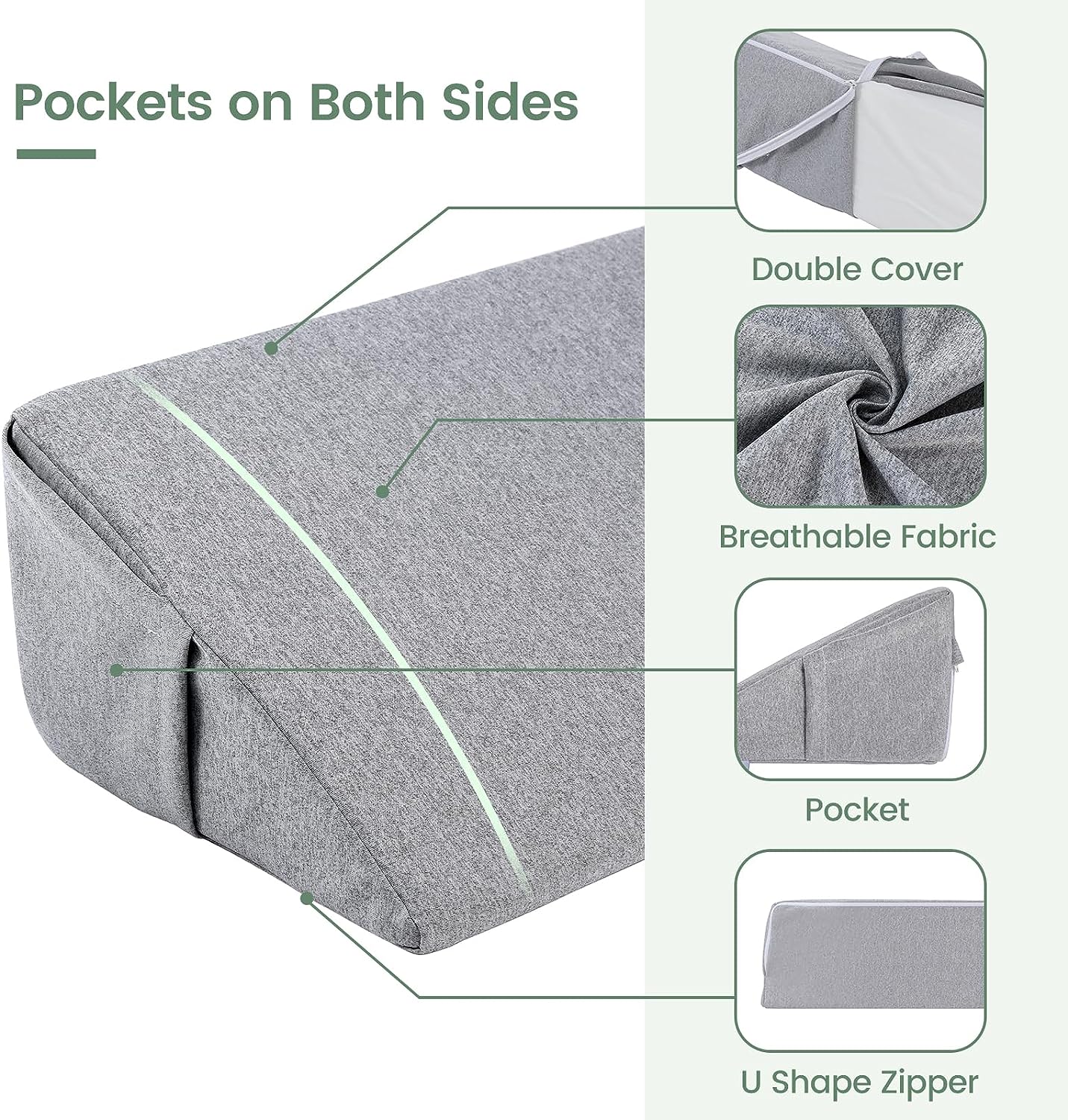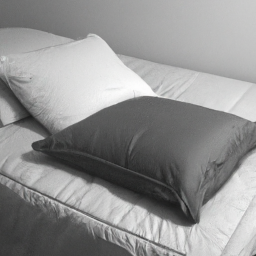If you’re considering using a wedge pillow for improved comfort or to alleviate certain medical conditions, you may be wondering if there are any potential adverse effects. In this article, we’ll explore the frequently asked question of whether a wedge pillow can cause any negative repercussions. By addressing this concern, we aim to provide you with a comprehensive understanding of the possible effects that may arise from using a wedge pillow.
Effects of Using a Wedge Pillow
Temporary discomfort
Using a wedge pillow for the first time may cause temporary discomfort as your body adjusts to the new sleeping position. This discomfort can manifest as a feeling of awkwardness or unease, especially if you are not accustomed to elevating your upper body while sleeping. However, it is important to note that this discomfort is usually transient and subsides as you get used to sleeping with a wedge pillow.
Breathing difficulties
While wedge pillows are generally designed to improve breathing and alleviate respiratory issues such as sleep apnea or acid reflux, some individuals may experience breathing difficulties when using them. This can happen if the angle of elevation is not suitable for your specific body type or if you have pre-existing breathing conditions that are aggravated by the elevated position. If you experience any difficulty breathing while using a wedge pillow, it is advisable to consult a healthcare professional for guidance.
Increased snoring
In certain cases, sleeping with a wedge pillow may lead to increased snoring. This can occur if the elevated position causes your airways to narrow or become partially blocked, resulting in vibrations during breathing. If you or your partner notice an increase in snoring after using a wedge pillow, it may be worth adjusting the elevation or trying a different pillow to find a more comfortable sleeping position that minimizes snoring.
Skin irritation
Some individuals may experience skin irritation when using a wedge pillow, particularly if they have sensitive skin or allergies. This can be exacerbated by factors such as improper pillow hygiene or the use of materials that can cause irritation, such as certain types of foam or synthetic fabrics. To prevent skin irritation, it is important to choose a wedge pillow made of hypoallergenic materials and to regularly clean and sanitize the pillow as recommended by the manufacturer.
Gastrointestinal issues
Though rare, some individuals may experience gastrointestinal issues when sleeping with a wedge pillow. This can occur due to the altered position of the upper body, which can affect digestion and the movement of food through the digestive system. If you experience symptoms such as stomach pain, acid reflux, or indigestion after using a wedge pillow, it is advisable to consult a healthcare professional to determine if the pillow is contributing to your symptoms.
Effects on Sleep Quality
Disrupting sleep patterns
Using a wedge pillow can disrupt your usual sleep patterns, especially if you are not accustomed to sleeping in an elevated position. The adjustment period required to adapt to this new sleeping position can result in difficulty falling asleep or fragmented sleep throughout the night. However, it is essential to remember that these disruptions are typically temporary, and many users find that their sleep quality improves once they adjust to sleeping with a wedge pillow.
Increased restlessness
In some cases, sleeping with a wedge pillow may lead to increased restlessness during the night. This can be attributed to the discomfort or unfamiliarity of the elevated position, causing you to toss and turn more than usual. To minimize restlessness, it is crucial to find the right angle of elevation that provides the desired benefits without sacrificing comfort. Experimenting with different wedge pillow heights and materials may help you find the optimal setup for a restful night’s sleep.
Impact on Body Alignment
Misalignment of the spine
One potential effect of using a wedge pillow is the misalignment of the spine. If the pillow’s slope is too steep or not properly positioned, it can exert excessive pressure on certain areas of the spine, leading to discomfort and potential misalignment. To prevent this, it is important to choose a wedge pillow that provides adequate support and aligns your spine in a neutral position. Regularly checking your posture while using the pillow and making necessary adjustments can help maintain proper spinal alignment.
Uneven weight distribution
Sleeping on a wedge pillow can result in uneven weight distribution, as the elevated position can cause more pressure to be exerted on specific body parts such as the hips or shoulders. This can lead to discomfort, muscle strain, or even pressure sores if proper precautions are not taken. To address this, it is advisable to incorporate additional support, such as using a body pillow alongside the wedge pillow, to distribute your body’s weight more evenly and reduce pressure points.
Muscle stiffness and pain
Using a wedge pillow for an extended period may contribute to muscle stiffness and pain, especially in the neck, shoulders, and upper back. This can occur if the pillow does not provide adequate support or if the elevation angle is not suitable for your body’s specific needs. To alleviate muscle stiffness and discomfort, incorporating gentle stretching exercises, proper posture, and regular breaks from using the wedge pillow can help prevent muscle strain and maintain optimal comfort.
Potential Allergic Reactions
Allergies to pillow materials
Individuals with allergies to certain pillow materials may experience allergic reactions when using a wedge pillow. These reactions can range from mild symptoms such as sneezing or itching to more severe reactions like difficulty breathing or skin rashes. To avoid potential allergic reactions, it is crucial to choose a wedge pillow made from hypoallergenic materials, such as natural latex or organic cotton. Reviewing the pillow’s label and consulting with a healthcare professional can help determine if the pillow is suitable for your specific allergies.
Dust mite infestations
Another potential concern when using a wedge pillow is the presence of dust mites. These microscopic creatures thrive in warm and humid environments, making pillows an ideal breeding ground. Individuals with dust mite allergies may experience symptoms such as sneezing, coughing, or a runny nose when exposed to these allergens. To minimize the risk of dust mite infestations, it is important to regularly clean and wash the wedge pillow according to the manufacturer’s instructions, as well as using anti-allergen pillow covers.
Precautions to Take
Choosing the right pillow
When purchasing a wedge pillow, it is crucial to choose one that suits your specific needs and preferences. Consider factors such as the materials used, the angle of elevation, and the level of support provided. If possible, try out different pillows or consult with a healthcare professional to ensure you select the most suitable wedge pillow for your body type and sleeping requirements.
Using the pillow correctly
To maximize the benefits of using a wedge pillow and minimize potential adverse effects, it is important to use the pillow correctly. This includes positioning it properly under your upper body, adjusting the angle of elevation to a comfortable position, and ensuring your head, neck, and spine are aligned. Following the manufacturer’s guidelines for usage and maintaining proper pillow hygiene by regularly cleaning and replacing the pillow can also contribute to a positive experience.
Monitoring for adverse effects
Lastly, it is essential to monitor and be aware of any adverse effects that may arise from using a wedge pillow. Pay attention to any new discomfort, breathing difficulties, snoring patterns, or skin irritations that may occur. If you notice any concerning symptoms, it is advisable to consult with a healthcare professional to address any potential underlying issues or determine if adjustments to the pillow or usage are necessary.
In conclusion, while using a wedge pillow can have numerous potential benefits for sleep and respiratory issues, it is crucial to be aware of the potential adverse effects. Temporary discomfort, breathing difficulties, increased snoring, skin irritation, gastrointestinal issues, disruption of sleep patterns, increased restlessness, misalignment of the spine, uneven weight distribution, muscle stiffness and pain, potential allergic reactions, and dust mite infestations can occur. By taking proper precautions, choosing the right pillow, using it correctly, and monitoring for any adverse effects, you can maximize the benefits and minimize the risks associated with using a wedge pillow. Remember to consult with a healthcare professional for personalized advice and guidance based on your individual needs and health conditions. Sleep well and enjoy the potential benefits that a wedge pillow can provide!







